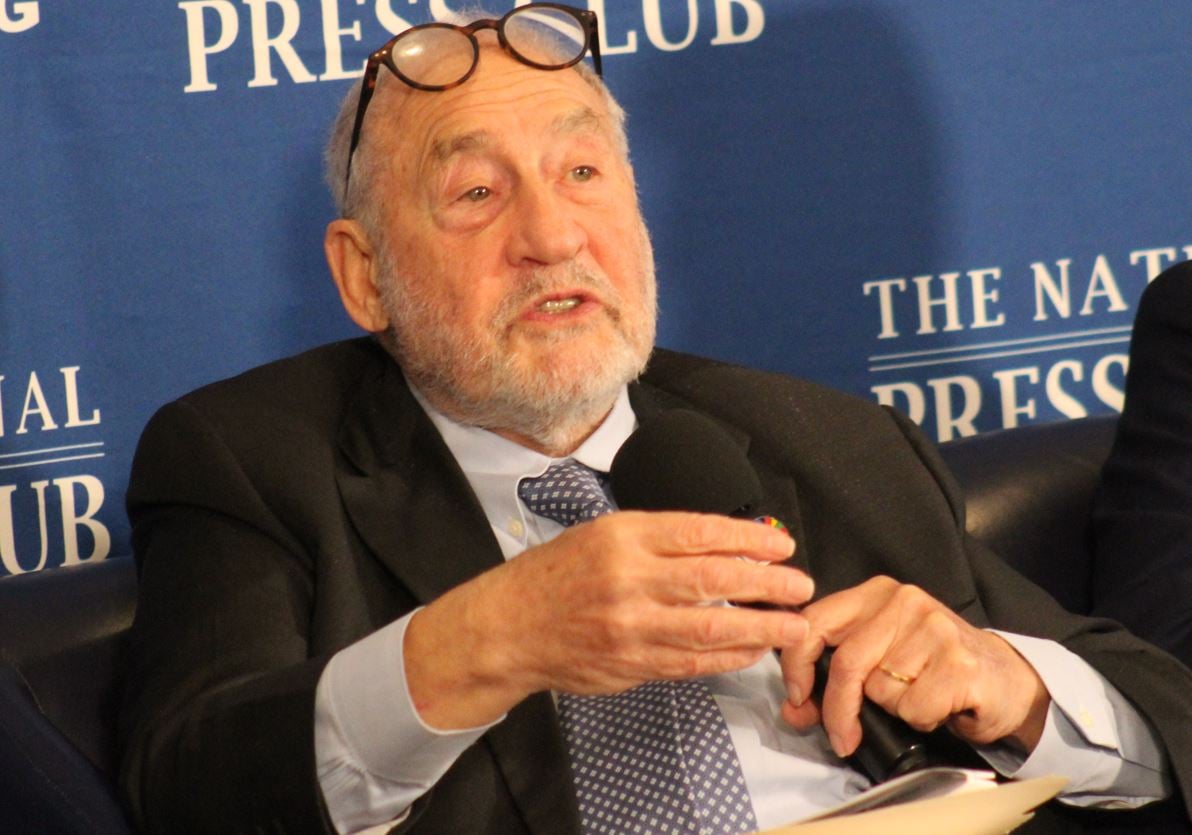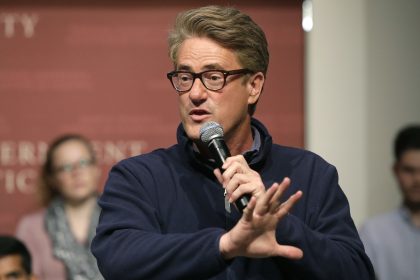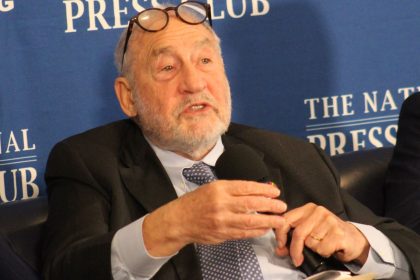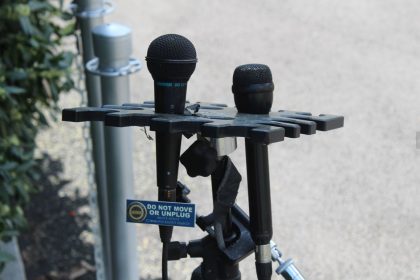Stiglitz Reminds News Consumers You Don’t Get Quality Journalism for Free

WASHINGTON — The press face many challenges, ranging from violence and treachery perpetrated against reporters to public figures diminishing the value of the work, though the most pernicious of all the threats besieging the profession may well be social media, a Nobel Prize-winning economist said.
“These companies are making billions in revenue … by stealing the intellectual property of the media,” Joseph Stiglitz said on Wednesday during a Coffee and Conversation event at the National Press Club.
“The question is what to do about it?” he said. “There’s a real debate right now about how our intellectual property laws are written. Some say they’re flawed because they were written from the corporate lawyers’ perspective, or from that of the policymaker.
“But whatever the case, I think given modern realities, they need to be rewritten so that there are ways of recapturing the value of what the media produces from those who aren’t producing that value,” he said.
Stiglitz’s comments before a packed house in the club’s First Amendment Room were a cornerstone of an hourlong discussion and audience Q&A, for which he was joined by Kristjan Burgess, a senior program specialist at UNESCO in Paris, and Arturo Herrera Gutiérrez, a global director of the World Bank.
Together they rolled out the publication of “Journalism for Development,” a new report highlighting the role press freedom plays in advancing democratic values and economic development.
The report was co-authored by Stiglitz, who received his Nobel Prize in 2001 for his work in information asymmetry, Anya Schiffrin, director of technology and media specialization at Columbia University, and Dylan Groves, an assistant professor of government and law at Lafayette College in Easton, Pennsylvania.
Among the report’s themes discussed by the panel was that access to information is key to a well-functioning, democratic society and a well-functioning economy, and that independent journalism plays a crucial role in transmitting that information.
The speakers also stressed the importance of creating policies to mitigate the harm the rise of large technology companies has done to the journalism industry, and challenges the digitization of the industry, including the potential of AI language models to generate false attribution and disinformation.
Along the way they also spoke of the need to support local journalism and of the need for institutional safeguards to prevent the capture of the media by a few wealthy individuals or entities.
“Anybody concerned with how well our society functions has to be concerned about the scope of journalism within the society. They have to be concerned about the ability of the press to do its job. And they have to understand, whether consciously or not, the economic idea of information as a public good,” Stiglitz said.
Unfortunately, attendees of the talk were told at the outset, the context of the discussion is quite grim at the moment. Attacks on press freedom are growing around the globe, with threats, crackdowns and the detention of journalists becoming almost commonplace.
According to the 2023 World Press Freedom Index — which evaluates the environment for journalism in 180 countries and territories and is published on May 3, World Press Freedom Day — the situation is “very serious” in 31 countries, “difficult” in 42, “problematic” in 55 and “good” or “satisfactory” in 52 countries.
In other words, the environment for journalism is “bad” in seven out of 10 countries and satisfactory in only three out of 10.
In countries led by authoritarian governments, the desire to maintain a stranglehold on information has led to the attempted intimidation or worse of any journalists they deem to be threats to their regimes.
A recent Freedom House report documents 112 acts committed against journalists over the last decade.
And all of this has been compounded by the collapse of the economic models that have sustained working journalists for decades.
Stiglitz said the accidental, but traditional, newspaper business model — advertisements and subscriptions — worked for over 100 years but basically came apart over the last 10 years due to social media.
“One of the basic ideas in modern economics is that the market will always under-supply those things that are considered to be … public goods,” said Stiglitz, who went on to explain that because everybody benefits from a public good, the incentive of any one individual to make the expenditures to create them would be too low.
“The implication of that is that in one way or another, there will have to be public support,” he said.
“What we had for most of our history was a peculiar but workable way of supporting journalism,” Stiglitz said. “Advertisements and subscriptions weren’t perfect. But at least they adhered to the principle that information is valuable. The value of bringing together news and advertising information was that it inspired people’s willingness to pay for subscriptions.
“Now, this business model was an accident and it was not the perfect solution to the public good problem, which is why, when radio and television came in, you started to see a rise in public support for these media,” he said.
Social media companies, he said, caused advertisers to believe that it was a preferred method for advertising because they can use algorithms to target consumers.
As the traditional method of advertising collapsed, so did paying for a news product, Stiglitz said.
“It really has been a dramatic, dramatic change and one which our society hasn’t fully grasped yet,” he said.
“In effect, we’ve replaced the old way of supporting journalism by creating a surveillance economy, where [a small group of companies] know more about you than you know about yourself and figures out what you will read and, maybe, prompt you to do things that maybe you don’t want to do.”
At this point, an audience member asked Stiglitz what he would say to a young person who has been indoctrinated into believing news and the information news organizations provide is free and is something they can readily access from their cellphones.
“That’s a great question, and one I’ll give you an economist’s answer to: There is no free lunch,” he said. “The producers in what is now called ‘legacy’ media, have got to be compensated for it.
“The fact that you’re getting it on your iPhone doesn’t mean that the news report is reaching you at zero cost,” he said.
“You don’t get quality journalism, you don’t do investigations, for free,” he added.
Stiglitz said one possible solution to the problem of social media capturing and diverting the value created by legacy media to its own ends might be the wider-spread adoption of the bargaining code that Australia has pioneered.
The News Media Bargaining Code is a law designed to have large technology platforms that operate in Australia pay local news publishers for the news content made available or linked on their platforms.
The law’s definition of news is broad, including “content that reports, investigates or explains … current issues or events of public significance for Australians at a local, regional or national level.”
Facebook and Google were fiercely opposed to the new law and Facebook went so far as to block Australian users from sharing or viewing news content on its platform.
The Australian government was unmoved and said Facebook’s actions merely demonstrated the “immense market power of these digital social giants.”
Days later, Australia and Facebook came to an agreement on restoring news pages.
The agreement came after Australian lawmakers agreed to include a two-month mediation period to allow digital platforms and publishers to broker deals before they are made to enter arbitration as a last resort.
The final bill said that if the sides are unable to reach a commercial deal, then government-appointed arbitrators can decide on the final price by ruling in favor of either party — the digital platform or the publisher — with no room for a middle-ground agreement.
“The code really made a difference,” Stiglitz said.
“Journalism for Development” closes with a series of recommendations or “pillars” for creating a robust and healthy environment for journalism.
The first pillar is journalists need to have access to information, or the right to know, enshrined in laws that are actually enforced.
The second pillar is that governments need to continue supporting journalism, whether by creating special funds or other initiatives such as providing funds for digitization, tax breaks, payroll credits or subscription vouchers.
In the final pillar, governments need to counter the declining viability of private media. They can do this by developing legal frameworks through which legacy media outlets can recapture some of the revenues lost to social media.
Competition laws and media ownership laws need to be updated for the digital age. Lastly, government financial support can be used to ensure plurality of views and the diversity of news sources.
Dan can be reached at [email protected] and @DanMcCue























